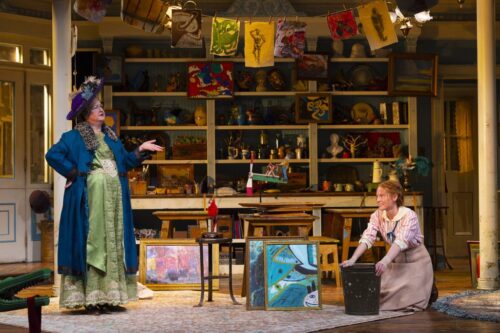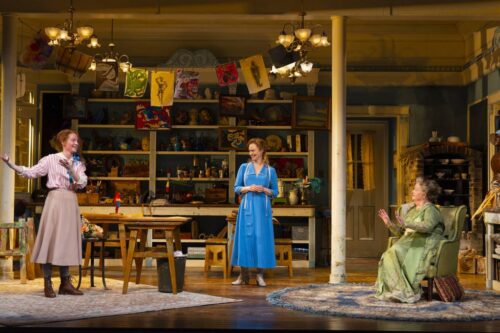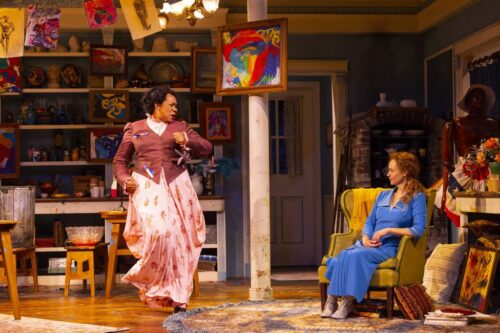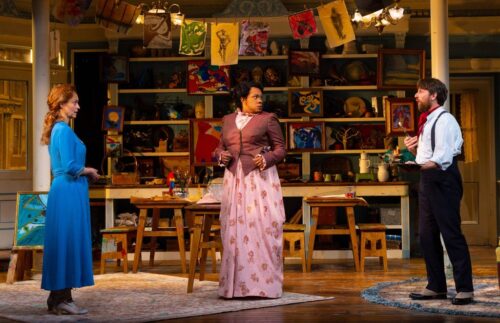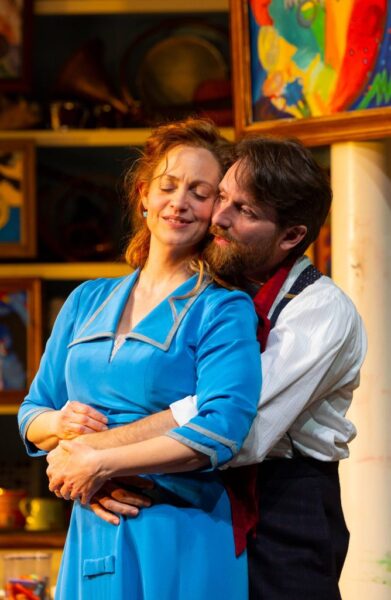FAITH, HOPE AND SCIENCE
I found myself thinking of Henrik Ibsen and Lucille Ball as I watched this world premiere of acclaimed playwright and performance artist Taylor Mac. Ibsen and Ball are not two names normally associated in my mind, but the early twentieth-century interior setting (Philadelphia, not Norway) — in which the commanding figure of Rosemary (Marceline Hugot) appears in her old-fashioned (for the time) clothing — carried me to the earlier nineteenth- and twentieth-century decades of Ibsen’s work, as did the dense layering of realism and philosophical ponderings (The Master Builder) and reflections on disease (Ghosts). As to Lucille Ball — I owe that to Stacy Fischer, who brings a delightful blend of physical comedy and earnest determination to her performance. She plays Joy in the first two acts and Joy’s daughter Pilly in Act III.
Directed by the Huntington’s new artistic director, Loretta Greco (formally the artistic director for Magic Theatre in San Francisco), this three-act play is an intriguing meditation on the role of belief that is especially relevant in our COVID-19 inflected and infected world. Can we end disease by refusing to believe in its existence? That’s the question this play asks, and while the answer (no) may seem obvious to many, we are asked to consider the power of believing in that possibility. Like Ibsen, whom Mac cites as an inspiration, this play offers a challenge that is more intellectual than emotional. Part of the challenge resides in the need to explain the underpinnings of Christian Science to a broad audience that is likely unfamiliar with this worldview. Mac (and the cast) handle this challenge with some success, but certain nuances of language (for example, the difference between succeed and achieve) were distracting for this viewer.
The first two acts are set in 1918, during the influenza pandemic. Joy, a convert to Christian Science, denies the reality of the pandemic, or perhaps believes that her denial can protect her and others from disease, as she expresses her determination to keep her children’s art school open by preparing for an open house to attract and keep students. Her motivation may be informed as much by financial necessity as by her faith, but her conviction that her beliefs will protect her (and others) from harm is expressed as well in her willingness to allow her teenaged daughter Pilly (Ella Dershowitz) walk the streets of Philadelphia unaccompanied after dark, a practice that shocks her mother-in-law, Rosemary. While Hugot as Rosemary is a commanding presence on the stage, so too is Fischer’s Joy and Breezy Leigh’s Melanie, mother of Marjory, the only African-American student and an outstanding artist at the school. The arguments between Rosemary and Joy on the value of abstract art reflect the aesthetic upheavals of the period as well as the difference in the two women’s outlooks. The animosity between Joy and Melanie is initially veiled but erupts into what we will eventually learn is a deadly attack.
This is a play about mothers and daughters (or mothers- and daughters-in-law), and — to quote Garrison Keillor — all the women are strong. Joy, with her religious convictions, as well as her luminous presence, exerts an influence even as she lies on her deathbed in Act III, and daughter Pilly — clearly no longer a believer — feels constrained in her language, insisting that her mother is “on the mend” when former art student Marjory, now an adult dressed in trousers and a vest in 1952, arrives to pay her respects. Joy’s husband Bradford (Ryan Winkles), the only male character in the play, is indeed (citing Keillor again) good-looking, but a feckless though charming and talented artist, which is acknowledged by both his mother Rosemary and Joy. He functions primarily as the glue that connects these women.
Each of the three acts opens with a cacophonic clatter of bells (sound by Fan Zhang), calling the audience to attention and reflecting the temporal context and emotional temperature of the characters. Jen Schriever’s lighting was most notable in the transition between the first two acts. Sarita Fellows’ costume design was especially effective in indicating generational and social distinctions as well as the time periods of the settings. Arnulfo Maldonado’s sets also contributed to transitioning the audience from 1918 to 1952 while never leaving the same interior space.
Joy & Pandemic
Huntington Theatre Company
The Huntington Calderwood/BCA, 527 Tremont St. in Boston
ends on May 21, 2023
for tickets, call 617-266-0800 or visit Huntington
for a streaming filmed performance (available May 15 – June 4, 2023),
visit Huntington Digital

